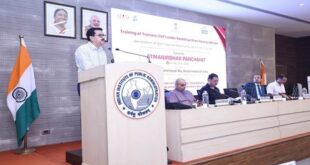- Tamil Nadu has pioneered an initiative across the State to reduce the mortality rate among people with tuberculosis.
- The initiative — TN-KET (Tamil Nadu Kasanoi Erappila Thittam, meaning TB death-free project) — which began in April 2022 in 2,500-odd public healthcare facilities that diagnosed TB in 30 districts, has already achieved significant reduction in the number of early TB deaths.
- Nearly 70% of all TB deaths among notified TB patients take place in the first two months after diagnosis. In Tamil Nadu, thanks to TN-KET, deaths within two months of TB diagnosis, referred to as early TB deaths, have reduced from more than 600 in April 2022 to less than 350 in December 2022.
- Also, the average time to death after diagnosis doubled from less than 20 days before April to 40 days in July 2022.
Differentiated TB Care
- The heart of the initiative is the ‘Differentiated TB Care’ aimed at assessing whether people with TB need ambulatory care or admission in a health facility to manage severe illness at the time of diagnosis.
- The differentiated TB care guidelines, released by the Central TB Division in January 2021, requires comprehensive assessment of 16 clinical, laboratory and radiological parameters.
- But the challenge is that undertaking the comprehensive assessment would take time, and most PHCs, many taluk and block-level healthcare facilities lack clinical and diagnostic capacity to carry out these assessments.
- In lieu of the 16 parameters, Chennai-based National Institute of Epidemiology (ICMR-NIE), which is spearheading TN-KET along with the State TB Cell, found that preliminary assessment (triaging) of patients based on just three conditions —
- very severe undernutrition, respiratory insufficiency, and inability to stand without support — was feasible for quick identification at diagnosis and referral for admission in a healthcare facility for comprehensive assessment and further management of the disease.
- The comprehensive assessment is mainly for identifying the medical conditions that require immediate treatment.
- Using only three conditions meant that people with severe TB illness needing immediate care were identified and admitted to a healthcare facility on the same day of diagnosis even under programmatic conditions, thus vastly cutting down the delay and increasing the chances of saving lives.
- The State has identified around 150 nodal inpatient care facilities with nearly 900 beds earmarked for people with TB who are severely ill.
- “Based on the death data in Karnataka, where we piloted triaging of TB patients at diagnosis based on severity in late-2020, we realised that at least 30-40% of the deaths can be prevented if triaging and appropriate care is provided to people who have severe illness
- According to him, of the over 42,500 adults who were diagnosed with TB between April and December 2022 in Tamil Nadu, nearly 3,300 were referred, comprehensively assessed and confirmed as severely ill at nodal inpatient care facilities. Of this, 3,100 (94%) were admitted for inpatient care. In December 2022, the referral, comprehensive assessment and confirmation of severe illness among eligible people improved to 88%.
- The triaging based on naked eye observation and measurements for oxygen saturation and respiratory rate to know respiratory insufficiency, especially during the pandemic, was highly doable.
- And we trained our supervisory staff, who are not nurses, to carry out these measurements at PHCs and triage people with TB.
Target achieved
- “The TN-KET initiative has already achieved the initial target of 80% triaging of patients, 80% referral, comprehensive assessment and confirmation of severe illness, and 80% admission among confirmed
- In December 2022, we reached the 90%-90%-90% goal at State level and now our target is to achieve the same in each district.
- Another challenge is to increase the duration of admission. For instance, people with very severe undernutrition, which comprises 50% of the admitted patients, the duration of treatment has to be long.
- At the State level, the average admission duration was five days between April and December last year, which improved to six days in December
SOURCE: THE HINDU, THE ECONOMIC TIMES, PIB
 Chinmaya IAS Academy – Current Affairs Chinmaya IAS Academy – Current Affairs
Chinmaya IAS Academy – Current Affairs Chinmaya IAS Academy – Current Affairs



